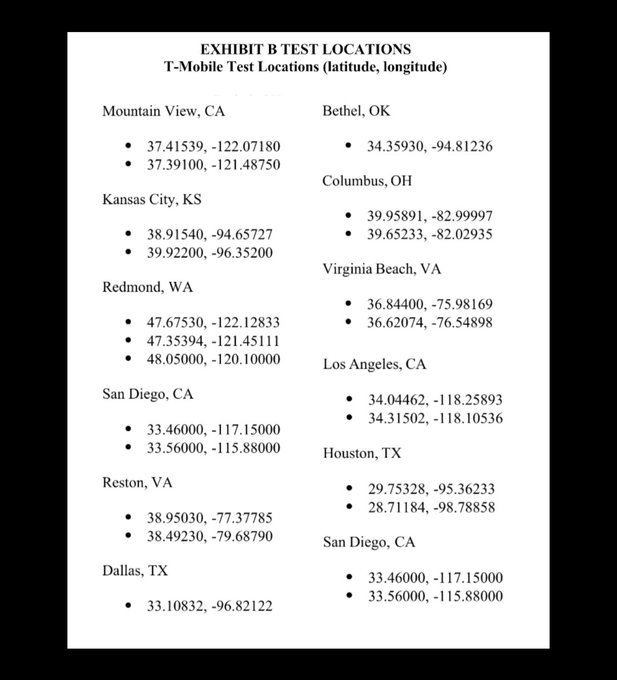Introduction: On December 10th, SpaceX is set to conduct a significant test of its Starlink satellite technology, involving the irradiation of populated areas in 13 locations across the USA. Thus creating control groups between different populations of microwave exposure from space. This event, while a leap in technological advancement, raises profound ethical concerns. It mirrors the structure of well-known scientific studies by the National Toxicology Program (NTP) and the Ramazzini Institute (RI), where some rats were exposed to RF radiation while others were not, to assess health risks.


The Parallels with NTP and RI Studies: Both the NTP and RI studies were landmark in their exploration of RF radiation’s effects on health. In these studies, rats were exposed to varying levels of RF radiation, and their health outcomes were compared to those of unexposed rats. The findings were significant: increased risks of certain cancers, including brain and heart tumors, in rats exposed to RF radiation levels similar to what humans experience with cell phone use.
Simulating Human Experimentation: The upcoming Starlink test, in essence, sets up a similar experimental design but with humans as subjects. By selectively irradiating 13 locations, it creates a scenario where some populations are exposed to heightened levels of RF radiation, while others are not. This situation is alarmingly reminiscent of the NTP and RI studies but lacks one critical element – consent.
Unconsented Human Experimentation: The Nuremberg Code, established post-World War II, underlines the importance of voluntary consent for any experimentation involving human subjects. The Starlink test, by exposing unaware and non-consenting populations to potentially harmful radiation, breaches this fundamental ethical principle. It transforms these populations into unwitting participants in a large-scale public health study.
What the NTP and RI Studies Found: The NTP study found clear evidence of tumors in the hearts of male rats exposed to RF radiation, as well as some evidence of tumors in the brains and adrenal glands. Similarly, the RI study observed an increase in heart schwannomas in male rats. These results point to a potential risk to human health – a risk that the Starlink test might inadvertently explore without ethical oversight.
The December 10th Starlink test raises critical ethical questions about the unconsented exposure of human populations to RF radiation. Drawing parallels to the NTP and RI rat studies, this event could be seen as a real-world, uncontrolled human experiment. As we advance technologically, it is imperative that we do not lose sight of the ethical considerations essential to protect public health and uphold human rights.
The Contemporary Concern: Microwave Technologies in Space
At RF Safe we would like to pivot to present-day concerns of electronic warfare, particularly focusing on the deployment of new microwave technologies in space, such as SpaceX’s Starlink service. While primarily commercial in nature, it raises the theoretical possibility that these technologies could be weaponized. With hundreds of satellites capable of beam-forming and concentrating power in small areas, there is a potential for misuse under the guise of technological advancement.
The deployment of technologies like SpaceX’s Starlink also touches on deeper ethical considerations, resonating with principles laid out in the Nuremberg Code. The Code, established post-World War II, underlines the imperative of informed consent and understanding potential risks in any experimental scenario involving human subjects. While primarily framed in the context of medical research, the essence of these principles extends to the deployment of new technology with unproven health impacts. The experimental nature of deploying such satellite systems, potentially exposing various populations to different levels of RF radiation, can be seen as a form of unconsented experimentation.
With SpaceX’s Starlink service planning to use frequencies in the 1910-1915 MHz and 1990-1995 MHz bands, which closely align with those examined for health risks (1947.47 MHz and 1977 MHz), the need for informed awareness and rigorous scientific scrutiny has never been more paramount.
MUSK’S PUTS CELL TOWERS IN SPACE
Isaacson said Musk told him it’s a form of “egotism” to want to be empathetic to a single person at the expense of the larger mission.
Should you worry about Musk turning you into a lab rat in your own home?
Elon Musk doesn’t have a natural feel for empathy or emotions, says his biographer who’s followed him for three years. This is obvious from his treatment of Neuralink test subjects!

Elon Musk’s biographer, Walter Isaacson, said the billionaire could go into “demon mode” at times — a state that Isaacson described as highly productive but “dark” and “with a real lack of empathy.”
